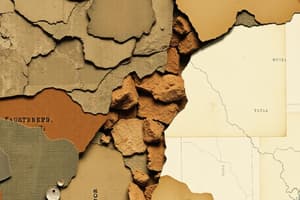Podcast
Questions and Answers
How does frost wedging happen?
How does frost wedging happen?
Water goes into cracks, freezes, and expands, making new cracks.
Name 3 different types of abrasion.
Name 3 different types of abrasion.
Wind carrying sand wears away rocks, rivers carrying sediments, ice moves over surfaces dragging rocks.
How does granite form layers like an onion?
How does granite form layers like an onion?
Rocks are uplifted, pressure reduces, and granite expands, forming flakes.
What is mostly affected by dissolving and what happens to that rock?
What is mostly affected by dissolving and what happens to that rock?
How does clay formation affect a rock?
How does clay formation affect a rock?
What part of a rock undergoes rusting?
What part of a rock undergoes rusting?
What type of weathering is pressure release?
What type of weathering is pressure release?
What type of weathering is clay formation?
What type of weathering is clay formation?
What type of weathering is dissolution?
What type of weathering is dissolution?
What type of weathering is rusting?
What type of weathering is rusting?
What is salt weathering?
What is salt weathering?
What is heat expansion?
What is heat expansion?
What is root weathering?
What is root weathering?
What is lichen growth?
What is lichen growth?
What rocks weather into round shapes?
What rocks weather into round shapes?
What rock weathers into caves and bumpy hills?
What rock weathers into caves and bumpy hills?
What rock weathers most quickly?
What rock weathers most quickly?
What rock weathers most slowly?
What rock weathers most slowly?
What weathering effects granite?
What weathering effects granite?
What weathering effects sandstone?
What weathering effects sandstone?
Which weathering effects limestone?
Which weathering effects limestone?
What weathering effects shale?
What weathering effects shale?
What climate helps clay formation?
What climate helps clay formation?
What climate helps frost wedging?
What climate helps frost wedging?
What climate helps dissolving?
What climate helps dissolving?
Hot and wet means more weathering.
Hot and wet means more weathering.
Flashcards are hidden until you start studying
Study Notes
Weathering Processes
- Frost Wedging: Occurs when water infiltrates rock cracks, freezes, expands, and creates new fractures.
- Types of Abrasion:
- Wind carrying sand erodes rock surfaces.
- Rivers transport sediments that wear down rocks.
- Ice moving on surfaces drags rocks, grinding down underlying materials.
Rock Transformation
- Granite Layer Formation: Uplifted rocks experience pressure reduction, enabling granite to expand and develop flakes.
- Limestone Dissolution: This sedimentary rock is predominantly shaped through dissolution, leading to features like pavements, caves, and sinkholes.
Chemical Weathering
- Clay Formation: Water exposure alters minerals into clay, which swells when soaked, causing rock disintegration.
- Rusting Process: Iron present in rocks undergoes oxidation, contributing to weathering.
Types of Weathering
- Mechanical Weathering: Involves frost wedging, abrasion, pressure release, salt weathering, heat expansion, and root wedging.
- Chemical Weathering: Includes processes like dissolving, clay formation, rusting, and weathering from lichen growth.
Rock Characteristics and Weathering Resistance
- Most Affected Rocks:
- Sandstone and granite weather into rounded shapes.
- Limestone and shale are susceptible to forming caves and uneven hills.
- Weathering Rates:
- Shale weathers the fastest, while granite shows the slowest weathering rates.
Weathering Influences
- Major Weathering Influences for Granite: Affected by frost wedging, clay formation, and pressure release.
- Conditions Favoring Weathering:
- Hot and wet climates promote increased weathering activity.
- Frost wedging and dissolution are most prevalent in cool and wet conditions.
Additional Weathering Types
- Salt Weathering: Resulting from crystal growth that can deteriorate materials.
- Heat Expansion: A weathering process commonly found in desert climates.
- Root Weathering: Caused by the growth and displacement of tree roots.
- Lichen Growth: Involves chemical weathering driven by algal and fungal colonies.
Studying That Suits You
Use AI to generate personalized quizzes and flashcards to suit your learning preferences.




